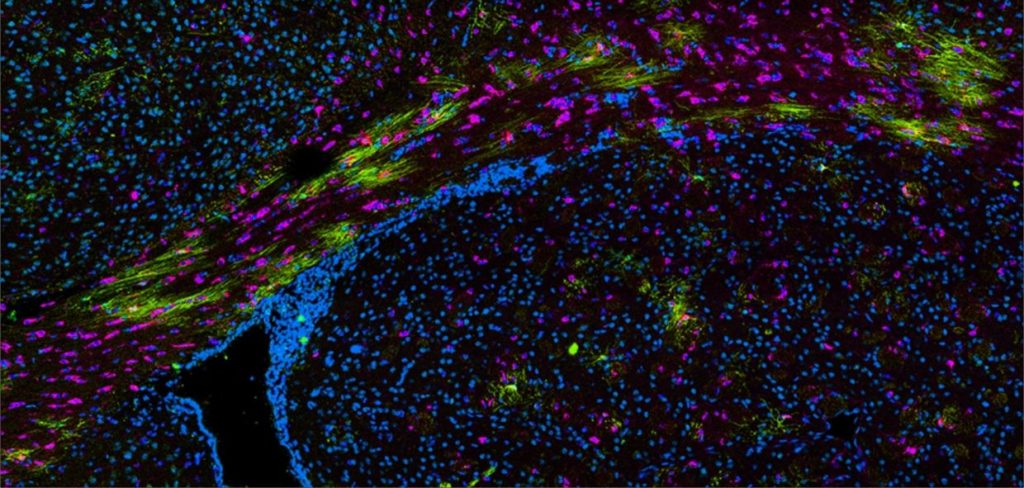Vital mechanism underlying the interplay between neuronal activity and myelination uncovered in new research
A new publication in the high-impact journal Nature Communications from the Merson group at the Australian Regenerative Medicine Institute (ARMI) has further defined the relationship between neuronal activity and the process of myelination, a critical step in the development of the central nervous system and in the maintenance of healthy brain function. This research provides novel insights into how the plasticity of the brain’s connections and circuits is controlled. This work was led by Postdoc Stanislaw Mitew and jointly supervised by ARMI’s Dr Tobias Merson and Dr Ben Emery based at Oregon Health and Science University.
The work represents an important advance in understanding how the cable-like extensions of neurons, known as axons, become myelinated. The ensheathment of axons with myelin serves both as an electrical insulator and source of nutritive support, and is essential for rapid neural transmission in the brain. The findings of the study have important implications for several debilitating neurodegenerative diseases, particularly multiple sclerosis (MS), in which myelin is lost.
While there was mounting evidence in the field suggesting a link between neuronal activity and myelination, how this interaction played out on an individual axon level remained a mystery- until now.
The study has demonstrated for the first time, that the level of electrical activity of each axon plays a major role in determining whether it will become myelinated. When the activity of a subset of neurons in the brain was elevated, the production of myelin-forming cells was increased and these new cells preferentially myelinated the activated axons. This suggests that neuronal activity is a powerful determinant in the selection of axons for myelination.

The publication was the cumulation of a collaboration between researchers from:
- Australian Regenerative Medicine Institute
- The Florey Institute of Neuroscience and Mental Health
- The University of Melbourne
- Melbourne Neuroscience Institute
- The University of Queensland
- Oregon Health and Science University
Dr Matthew Miles CEO of MS Research Australia said “We are proud to be supporting the incredibly important work of Dr Merson. There is a real need for more research into MS as we are getting so much closer to stopping and reversing the disease’s effect, and Australian researchers like Dr Merson are at the forefront of research breakthroughs. With the increasing pressures on medical research funding in Australia, it is crucial that we are able to support our best and brightest to keep up the momentum in MS research.”
These findings make a vital contribution to our understanding of the adaptive capabilities of the brain, the regulatory mechanisms that underlie these processes and how this could be manipulated. “By delineating this relationship at the cellular level, we can begin to unravel the unknowns of the brain, contributing to the development of therapies aimed at treating and even reversing the damage that occurs in neurodegenerative diseases, particularly MS,” commented Dr Merson. The Merson group is currently investigating whether therapeutic stimulation of axons could assist in the regeneration of myelin in order to reverse the damage caused by MS.
The Nature Communications paper is available online.
For more information on Dr Tobias Merson and his group at ARMI please visit the Merson group page.
Contact information
Dr Tobias Merson
Group Leader, ARMI
Phone: +61 (03) 9902 9606
Email: tobias.merson@monash.edu
Notes to Editors About ARMI
The Australian Regenerative Medicine Institute (ARMI) is dedicated to unlocking the regenerative capabilities of the human body. ARMI is a medical research centre based at the Clayton Campus of Monash University. Boasting 17 research groups studying a variety of regenerative approaches, ARMI is one of the largest regenerative medicine and stem cell research hubs in the world.
